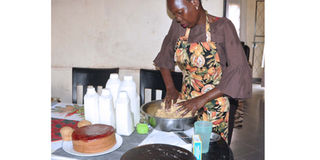Growing a pastry business at Akumu’s dining room

Joan Akumu preparing pastries in her home. Photos by Eronie Kamukama
What you need to know:
Out of the box. When Joan Akumu lost her job, she thought the world had come crumbling down on her. But right in her apartment, she started her pastries business through making potato crisps, cakes and cookies. She also makes cosmetics, and detergents for sale. Eronie Kamukama shares.
I t is at the dining table that I find Joan Akumu mixing dough to bake cookies. The buttery aroma of the peanut floated beneath my nose taking me back to my cravings. But for Akumu, it invoked memories of setting up her home business. Right in her apartment in Kyaliwajjala, a neighbourhood in Kiira Municipality, Wakiso District, she makes potato crisps, yoghurt, cakes, cookies, doughnuts, cosmetics and detergents for sale.
After she lost her job as a social worker in northern Uganda, she found her place in the pastries business. Around the same time, she gave birth to her first baby and found it very difficult to leave her baby in the hands of househelps. As she searched for jobs, her sister advised her to utilise her the time she had to supply snacks to her office.
How she started
“I started with crisps but my clients asked for more. That led me to daddies, soya beans, cookies, cakes and yoghurt. Everytime, I supplied snacks, my clients critiqued my work. Instead of getting emotional, I chose to use the feedback to improve my products,” Akumu recalls her humble beginnings.
With only Shs20,000 from her fiancé, she made her first potato crisps. This motivated her to join the Women in Business Club at dfcu bank and it is through a series of training she has been exposed to that her business has grown tremendously. There she met women with similar objectives.
“I did not know how to market my products. I wondered whether they will be accepted on the market. This put me under too much pressure. When we visited the Food Science Department at Makerere University, we were advised to work with Uganda Industrial Research Institute (UIRI),” Akumu explains.
The money she made from crisps paid for her subsequent trainings. Her value addition classes, however, commenced in the cosmetics department, since she had already implemented the idea of producing lotions. Her processes were faulty. Not even the measurements for the ingredients met the standards.
Challenges
Today, sweet as her pastries may be, the business is not far away from hurdles. Behind closed curtains are inadequacies of capital, only a burden eased by re-investing the profits and her fiancé. That is besides stiff competition and low purchasing power of clients.
“Many of the customers like to buy but on credit. This means I have to wait for a long time for payment to fulfil future orders. I tried partnering with grocery stores but payments are still delayed. They only pay after all the goods supplied are sold. Money was tied up in those businesses,” Akumu laments.
Production process
The production process is still largely manual from baking to yoghurt production. At this point, she has registered her brands and wants to open up a pastries shop. This should give the business more visibility and grow her clientele. It should pay her better so that she can employ a second person in the business. She estimates her monthly sales at Shs600,000, but the principle of book keeping is still lacking.
“I have a receipt book but I do not have the time to balance stock and supply. Profits are automatic because if you calculate operational costs, I can estimate profits. Money withdrawn from the business to cater for home expenses, is refunded.”
Great future
Her vision is bigger than expanding her business. She has a heart for empowering people in rural areas. “It hurts me to see people with hands and legs begging for Shs100, yet once given an opportunity, they can start income generating projects,” Akumu says. Her quest is for women like her to be aided in accessing capital, given the fear of taking loans from existing commercial banks.




